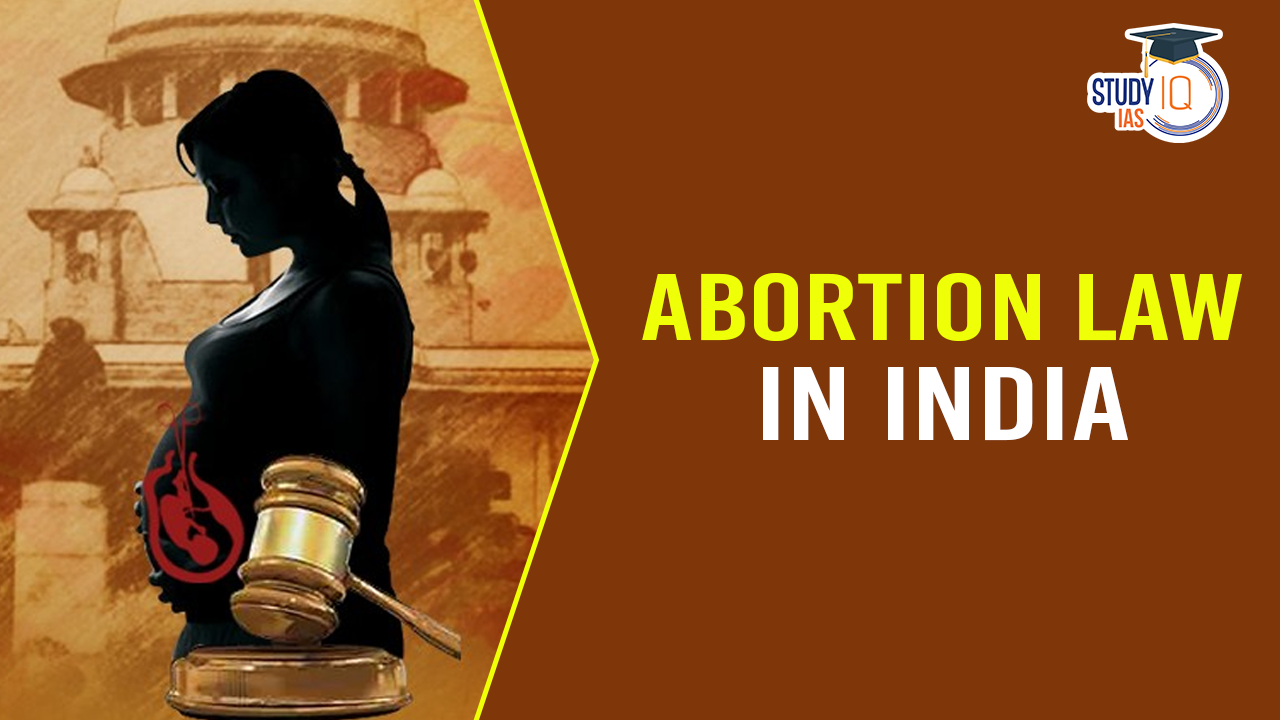Table of Contents
Abortion laws in India are governed by the Medical Termination of Pregnancy (MTP) Act, enacted in 1971. This legislation decriminalizes abortion under certain circumstances, aiming to protect women’s health and ensure reproductive rights across the country. Check Details on Abortion Laws in India in this Article.
Abortion Laws in India
Medical Termination of Pregnancy (MTP) Act of 1971 aims to safeguard women’s health, ensure access to safe procedures, and balance ethical considerations regarding fetal life.
Key Provisions of the MTP Act
The MTP Act allows abortions under the following conditions:
- Up to 20 Weeks: Abortions can be performed based on the opinion of one registered medical practitioner. This provision applies primarily to protect the woman’s life or physical or mental health, in cases of fetal abnormalities, rape survivors, or contraceptive failure.
- 20 to 24 Weeks: Abortion can be considered in exceptional cases, with the opinion of two medical practitioners, when continuation of the pregnancy poses risks to the woman’s life or health, or if the fetus shows substantial abnormalities.
- Beyond 24 Weeks: Abortions after 24 weeks require approval from a medical board, which evaluates severe fetal abnormalities or risks to the woman’s health.
Evolution and Amendments
Over the years, amendments have been made to the MTP Act to address emerging needs and challenges:
- 2021 Amendment: Expanded grounds for abortion, including cases of contraceptive failure and broader access for unmarried women.
- Judicial Interpretation: The Supreme Court of India has played a crucial role in interpreting and applying the MTP Act, often adjudicating cases that challenge its provisions and expanding access to safe abortions.
Legal Challenges and Public Debate
Despite legal provisions, challenges persist in ensuring universal access to safe abortions:
- Access Barriers: Women in rural and remote areas face challenges accessing healthcare facilities offering abortion services, leading to delays and increased health risks.
- Stigma and Awareness: Social stigma surrounding abortion and lack of awareness about legal rights contribute to underutilization of available services and misinformation.
Women’s Reproductive Rights
The debate over abortion in India revolves around women’s reproductive autonomy, health, and equality:
- Reproductive Autonomy: Recognizing abortion as a fundamental right empowers women to make decisions about their bodies, ensuring autonomy and dignity.
- Health and Safety: Legalizing abortion protects women from unsafe procedures and complications, promoting public health and reducing maternal mortality.
Recent Supreme Court Decisions on Abortion
The Supreme Court of India plays a pivotal role in interpreting and applying the MTP Act, often adjudicating on cases that challenge its provisions:
- Landmark Cases: Recent decisions have expanded the scope of permissible abortions, such as allowing the termination of pregnancies beyond 24 weeks in cases of severe fetal abnormalities or risks to maternal health. These decisions reflect the court’s commitment to balancing reproductive rights with ethical considerations.
- Public Debate: Each case involving late-term abortions sparks public debate and legal scrutiny, highlighting the complexities of balancing fetal rights with maternal autonomy and health.
Why Should Abortion be a Fundamental Right?
The debate on whether abortion should be considered a fundamental right in India revolves around several key arguments:
- Reproductive Autonomy: Recognizing abortion as a fundamental right empowers women to make decisions about their bodies, ensuring autonomy and dignity.
- Health and Safety: Legalizing abortion protects women from unsafe procedures and complications that arise from clandestine abortions, thereby promoting public health.
- Equality and Justice: Ensuring access to safe and legal abortion services is essential for gender equality and social justice, especially for marginalized communities.
Legal Status and Challenges
Despite legal provisions, challenges persist in ensuring universal access to safe abortions:
- Access Barriers: Women in rural and remote areas often face challenges accessing healthcare facilities that provide abortion services, leading to delays and increased health risks.
- Stigma and Awareness: Social stigma surrounding abortion and lack of awareness about legal rights contribute to underutilization of available services and misinformation.
- Judicial Discretion: Judicial interpretation of the MTP Act varies, leading to inconsistencies in granting permissions for abortions, especially in cases approaching or beyond 24 weeks of gestation.
Conclusion
India’s abortion laws, governed by the MTP Act, aim to balance the rights of women with ethical considerations regarding fetal life. While the legal framework has evolved over the years to broaden access and safeguard reproductive rights, challenges in implementation and interpretation persist. The Supreme Court’s role in adjudicating on complex cases continues to shape the legal landscape, influencing policies and practices that impact women’s health and autonomy across the country.


 Geo-tagging of Buildings During Upcoming...
Geo-tagging of Buildings During Upcoming...
 Gender Gap in Educational Expenditure in...
Gender Gap in Educational Expenditure in...
 Reservation and 50% Cap: Constitutional ...
Reservation and 50% Cap: Constitutional ...

























